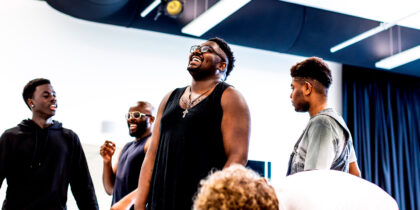Experiences from the Shifting the Dial project
Kadra Abdinasir and Shaheem Carty
Covid-19 has exposed and amplified existing inequalities in our society. Young Black men are one such group who have faced historic and appalling injustices and many of the challenges they face have a devastating impact on their mental health and wellbeing.
Young Black men’s mental health during Covid-19 explores evidence of the unequal effects of Covid-19 on young Black men, including from the Shifting the Dial project in Birmingham that Centre for Mental Health is evaluating. It finds that:
- Disruption to education is widening inequalities experienced by young Black men, who are more likely to be excluded and have their grades underpredicted
- Young Black men aged 16-25 are amongst the hardest hit by job losses and are more likely to report a fall in income because of lockdown
- Covid-19 enforcement and policing are disproportionately affecting young Black men, who are much more likely to be stopped and searched and issued fines for breaching lockdown measures
- As a result of some of these challenges, young Black men are at risk of higher levels of mental distress during the pandemic compared to other groups.
This briefing calls for urgent cross-government action to address the inequalities faced by young Black men, and to offer tailored support to protect their mental health and future prospects. It also calls for targeted educational and employment support for young Black men, a moratorium on all school exclusions in the aftermath of the pandemic, and a review into their policing during the pandemic.
Shifting the Dial is a ground-breaking 3-year programme seeking to promote positive mental health among young African Caribbean men aged 16-25 in Birmingham, generously funded by The National Lottery Community Fund. The partnership consists of Birmingham Repertory Theatre, Centre for Mental Health, First Class Foundation and NHS Birmingham and Solihull Mental Health Foundation Trust.





